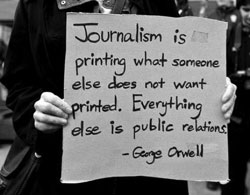Does this Communication Concentration Limit Students?
 Public relations specialists are often referred to as “spin doctors” by journalists. Journalists are often referred to as “blood suckers and liars” by public relations specialists.
Public relations specialists are often referred to as “spin doctors” by journalists. Journalists are often referred to as “blood suckers and liars” by public relations specialists.
If the two do not bring out the best in one other, then why does Monmouth University pair them under one concentration for a Bachelor of Arts in Communication?
Albright College in Reading, PA, has a degree in public relations and advertising, a tactic used in marketing. The college has made a separate degree for those who wish to major in journalism.
Similar is the case of schools out west such as Utah State University who pairs public relations and marketing.
The University of Tennessee instead has public relations mixed with advertising/marketing for a degree option and journalism is paired with electronic media.
If this trend is being seen nationwide, why is Monmouth University an exception?
“The crucial ‘publish and be damned’ culture of journalism is the very antithesis of the carefully controlled messaging of the PR world,” journalist Steve Loynes wrote in a Huffington Post article which was published last year.
With this line, Loynes’ essentially settles a long argument on the similarities and differences between journalists 0000.and public relation specialists.
A journalist is willing to do nearly anything to find a story, lead or get an insider to give them the scoop.
A public relations specialist works to cover-up any story which could put their organization, or an organization they work for, in harm’s way.
While it is understandable that the two professionals must understand the other’s job, they should not have to be able to perform the other’s job.
Instead, public relations should be paired with a more useful degree such as marketing. The same theory applies to journalism.
Recently, journalists have been required to become accustomed to the digital masses as their job now requires the use of social media, film and the internet.
In this sense, the concentration of journalism should either be paired with digital media courses or include just one digital media course as a requirement. Even the Introduction to Television course the University already provides could further a journalist’s skills.
Gina Columbus, an alumnus, is now fully employed by The Asbury Park Press (APP). Columbus graduated with a degree in communication and a concentration in public relations and journalism. She believes that digital media expertise is essential for the modern journalist. She even said that she is required to use digital media in her everyday work atmosphere.
“There is no way around digital media if you’re a journalist in this day and age. It’s just not possible. It’s understood by print media that not as many people are subscribing to their daily papers because of how incredibly fast and convenient it is to read news online – whether it is through a website, through Facebook and Twitter, you name it,” Columbus said. “You have to know how to use social media professionally and you have to be able to shoot photos and videos (and edit them too).”
Columbus added that as a journalist, you must quickly learn how to use these media skills because it is what is now expected by editors.
“Here’s the kicker, you have to be able to do it from anywhere, not just at your desk. If you graduate and are looking for a job in [the journalism field] but have no plans to take digital into consideration, you’re already behind when you haven’t yet begun”, Columbus said.
Gidget Zidik, a junior majoring in PR/journalism, said it appears the same situation is happening in the public relations side of the concentration.
“I was planning to apply for a public relations internship for Burton Snowboards, but that wasn’t an option. Instead, all of the public relations responsibilities such as writing press releases and strategically planning social media tactics was listed under the marketing internship position.”
Zidik furthered her point by stating she has not taken a marketing class yet, but she feels she has to because the two professions often work in close quarters.
I find this situation to occur more often than not, when pursuing internship possibilities. The most recent incident that I can recall is my application for an internship with Comcast Sportsnet in Philadelphia, PA.
The first line of qualifications for the network’s marketing internship reads, “College students pursuing degrees in marketing, sports management or communication with an interest in public relations.”
The internship does not mention anything about journalism but instead, pairs marketing and public relations.
Even in my sports public relations textbook, there is a chapter strictly devouted to the coordination of marketing and public relations.
By the University’s decision to keep journalism seated with public relations and have it as a concentration in communication, the school is limiting student’s potential and student’s abilities to secure internships and jobs.
It is assumed that students who have a knowledge in public relations also know a great deal in marketing, and this cannot be said for MU.
Employers will also assume that the graduating journalist will know how to shoot, edit and release a video package, but that cannot be assumed either.
That is why if one is looking to gain a concentration in public relations, I thoroughly believe they should be required to take Principles of Marketing, and journalism majors should do the same with digital media to better their chances at performing efficiently after graduation.
PHOTO TAKEN from brianhayes.com

